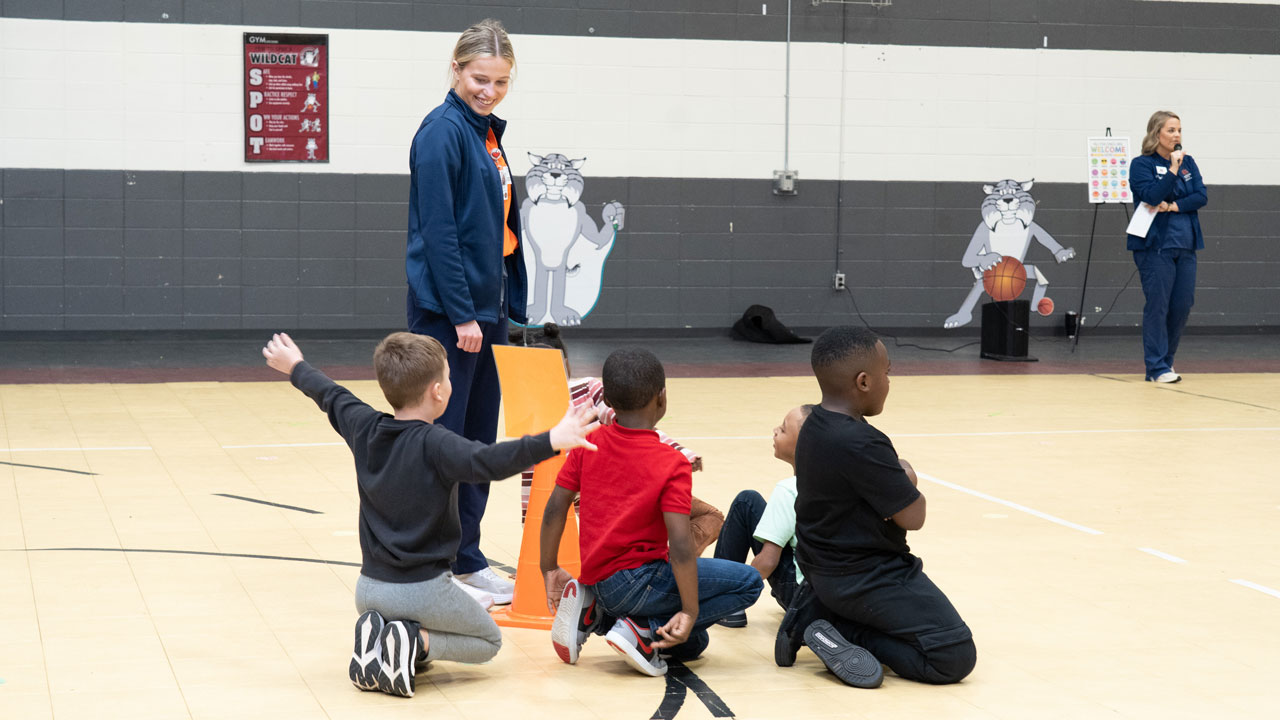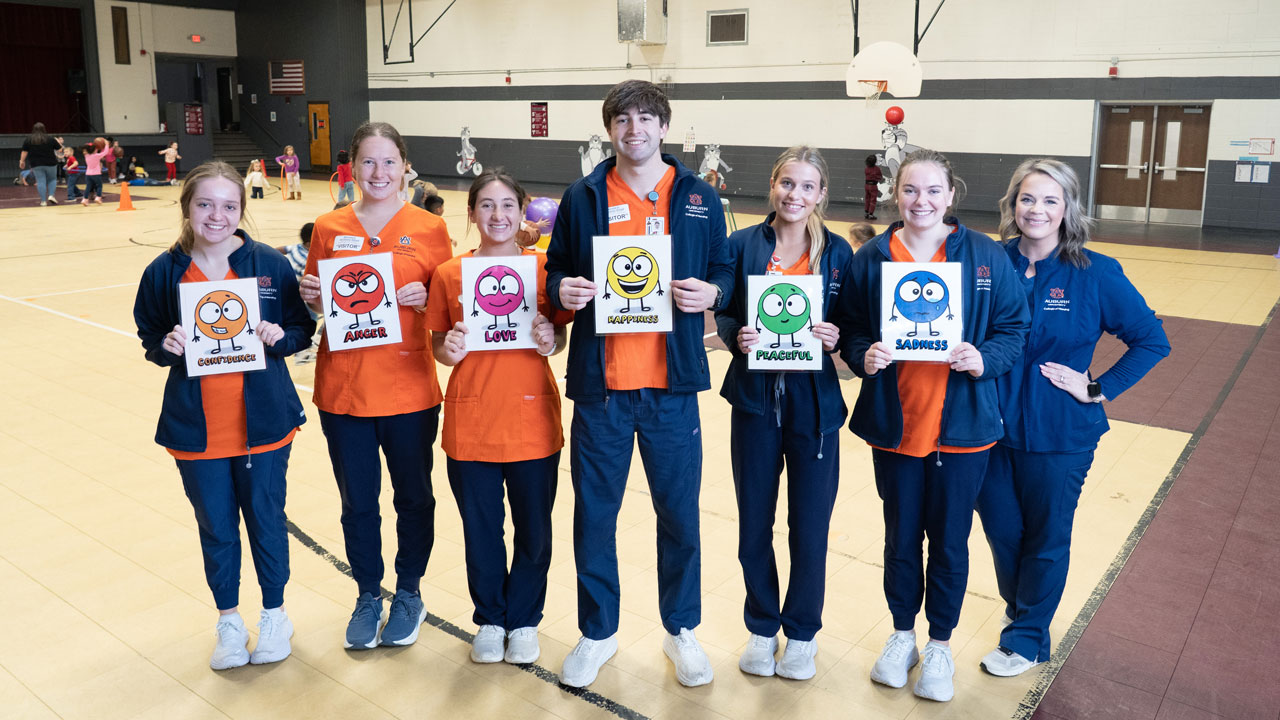content body

Auburn Nursing students and faculty recently visited Jim Pearson Elementary School in Alexander City for TigerCHAT, a community health education program focused on helping children and families develop healthy habits.
The sounds of excited first graders fill the gym at Jim Pearson Elementary School in Alexander City as they scurry around the room to answer the question: “How does it make you feel when someone gives you a hug?”
Auburn nursing students are posted throughout the gym, holding signs that represent different feelings, from love and happiness to anger and sadness. As you might expect, most of the children run to the signs for love and happiness.
The activity during the children's recent PE class is a part of the TigerCHAT (Community, Health, Awareness and Training) curriculum, a program from the Auburn University College of Nursing that’s been making a lasting impact on elementary-aged children in rural Alabama schools for the past eight years — due in large part to ongoing philanthropic support from the Russell Medical Foundation.
“The overarching goal of TigerCHAT is to help children and their families develop sustainable health behaviors, promote wellness and prevent disease,” says Erin Thornton, assistant clinical professor and TigerCHAT leader.
The program has reached more than 15,000 children since its inception and successfully expanded the curriculum this year to include a module on mental health.
Teaching healthy habits
Philanthropic support enables TigerCHAT volunteers to go to eight schools in Alexander City and Tallapoosa County, Chambers County, Lee County and Bullock County for 12 sessions over the course of 18 months. Each session is focused on health behaviors, with five lessons dedicated to the brain and mental health, four on the heart and the remainder on the lungs and staying healthy.
“Generally, each session begins with a short overview of the day’s topic, then we break the children up into small groups for a focused activity that’s led by our nursing students,” Thornton said. “To wrap up, we’ll get everyone back together in a large group to play a game to identify what they’ve learned that day.”
At the end of each TigerCHAT session, families receive a newsletter detailing what their children have learned. This ensures that the lessons on health and wellness are reinforced at home, fostering a supportive environment for developing sustainable health behaviors.
Recognizing the growing need for mental health education, TigerCHAT has evolved to address topics such as managing worry and fear. Teachers requested additional support in these areas, prompting the program leaders to integrate modules on emotional well-being, like strategies for handling anger positively.
Jevon McKinney, physical education teacher at Pearson Elementary, said the children enjoy the TigerCHAT visits from Auburn students and faculty.
“They always ask when the orange people are coming back,” he said, referencing the branded scrubs the nursing students wear. “They have a great time learning about different things: we’ve done dental health, healthy food choices and today, we focused on identifying emotions. It gives our students time to interact with different role models, and they get so excited.”
Fellow physical education teacher Carter Loyd ’22 agreed that collaboration is great for the students.
“I think it is really cool because I grew up here, so I obviously have connections and ties to this school system. But I also graduated from Auburn University, so it's just incredible to see the two places that I've been and have had connections with coming together in my hometown.” Loyd said. “The children are responding to the program, and it's just been going really well.”

Auburn Nursing students pictured with Erin Thornton, assistant clinical professor (far right). Participating in TigerCHAT allows nursing students to develop deeper understanding of concepts they learn in in the classroom and helps provide crucial health education to children in rural Alabama schools.
Education in action
Nursing students are essential to the operation of TigerCHAT. They use the specific learning objectives of each module in the evidence-based TigerCHAT curriculum to create engaging activities that help children absorb the lessons in a fun and effective way. Each semester, students come up with new learning activities to meet the given objectives.
“A lot of our experience in the nursing program so far has been with adult patients, so it’s been a fun learning experience working with the children, and it’s a good reminder that we might be working with different age populations as nurses,” said Auburn nursing student Kathleen Hawkins.
One of the most remarkable aspects of TigerCHAT is the strong rapport the children build with Auburn students. Younger students see the nursing students as role models, fostering trust and openness.
MacKenzie Reilly, a senior nursing student, noted that part of the fun of interacting with the children is seeing and hearing the ways they process and express their thoughts. During the day’s game of “Four corners,” Reilly was stationed at the corner with the emotion love. When a girl walked to her in response to the question, “How do you feel when someone steals your toys,” Reilly was curious.
“She told me that it was her little brother who always stole her toys, and she loves him, so that’s why she thought of love,” Reilly said. “Being able to identify your emotions is important. Having healthy coping skills of what to do and what not to do in response to your emotions starts with recognizing how you’re feeling.”
Making a difference
Not only does the TigerCHAT program support the educational mission of the College of Nursing, but it is also aligned with the university’s mission as a land-grant institution to serve the citizens of Alabama.
The impact of this innovative program would not be possible without the Russell Medical Foundation, whose philanthropic support for TigerCHAT provides toolkits and training for teachers by Auburn Nursing faculty, plus T-shirts for children where Auburn has implemented the program.
“We are grateful for our relationship with Russell Medical Foundation because it allows us to fulfill our land-grant mission to serve the children and families in the region, as well as afford opportunities for undergraduate and graduate nursing students to have a positive impact on the health and wellbeing of Alabama children,” said Linda Gibson-Young, outreach coordinator in the Auburn College of Nursing.
Discover more stories about the powerful impact of giving at Auburn.
Spirit of Giving



